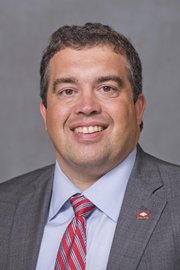State officials soon will start a statewide program of drug screening and testing for the heads of thousands of needy Arkansas families who apply for and receive government aid.
Reader poll
Should the state drug-test the heads of needy Arkansas families who apply for and receive government aid?
- No
- Yes
2870 total votes.
On Wednesday, the head of the Department of Workforce Services, Daryl Bassett, said he expects the state to begin statewide screening and testing within "seven to 10 days."
Supporters claim the program will improve the quality of the workforce, send those in need to drug treatment and safeguard government money from being spent by drug users.
But critics argue the program could cost too much for its return.
State officials have estimated that the program will cost from $1.45 million to $1.7 million a year, while providing $40,000 in savings, because of people deemed ineligible to receive benefits because of drug use.
The program was authorized under Act 1205 of 2015. Under that law, the state could have first set up a pilot program to test welfare recipients in counties bordering states that already check those who receive similar aid.
But a memo sent out Tuesday night by Gov. Asa Hutchinson's staff to lawmakers stated that the administration planned to go ahead and require testing statewide. The memo also projected that the statewide program would cost $1.7 million to get started.
But Bassett said estimates of the cost of the program are merely projections and it's impossible to know exactly how much money the state will spend.
"We've never done this before," Bassett said. "We were looking at other states that have done it. ... At this point, we don't have any idea of what this cost is going to be to us because we don't know how many [welfare applicants] will show as 'suspicious.' ... We don't know how many will have to go to testing."
In 1996, Congress created the Temporary Assistance for Needy Families Program to help families affected by poverty or lack of work.
The mix of federal and state money goes to those unemployed but also requires recipients to show that they are seeking to gain employment. It also helps supplement incomes of those who are working but demonstrate they are still in need.
In Arkansas, 3,000 to 4,000 families receive financial aid, on average, for about 11 months, according to Workforce Services statistics. Last fiscal year, the welfare program received $3.6 million in state funds and about $56 million in federal funds, according Workforce Services officials.
Those applying to get or renew the temporary benefits will be screened through the Department of Human Services and answer a brief questionnaire regarding drug use.
If their answers raise a flag for administrators, Bassett said, applicants will be referred to a private contractor to take a drug test that will cost about $69 each, according to officials in Hutchinson's office.
If an applicant refuses to be tested, he will be denied benefits for six months. If they are tested and are positive for drug use, they can receive aid so long as they follow treatment or recovery plans set by state officials.
If an applicant continues to test positive for drugs at the end of treatment program -- or fails to complete it -- he is excluded from receiving the funds directly, but the benefits will still be routed to the party's family.
The co-sponsor of the legislation that enabled the program, Rep. Robin Lundstrum, R-Springdale, said it's a "conservative" but fair way to protect tax dollars and families and encourage drug treatment.
"I want to see that the money gets into the hands of the truly needy, get it to those kids, whoever is in charge [of the money] needs to be drug free," Lundstrum said. "They're getting taxpayer dollars. It needs to go where it's originally destined."
Lundstrum's legislation, which also was sponsored by Sen. Blake Johnson, R-Corning, was first aimed at testing those in regions bordering states with existing drug-testing laws.
But by late fall, according to Johnson, officials in Hutchinson's administration determined that it made sense to roll out the program statewide. According to Bassett, there were concerns that the state's program could face a legal challenge if it isolated a particular region or demographic.
"If you're going to do it, might as well do it," Johnson said Wednesday. "Don't get a little wet."
Lawmakers, like House Minority Leader Michael John Gray, D-Augusta, hadn't heard much about the program until Hutchinson's office sent out a memo to lawmakers Tuesday night.
The plan to impose the drug screening, and potential testing, of recipients statewide was unexpected.
"I think the governor's choosing to not follow the intent of the legislation. The intent was to have a pilot program, to see the efficiency and effectiveness of the program and not spend money statewide," Gray said. "At a time where we hear the governor talk about how the budget is, and programs he's had to cut, it's real interesting that he chooses to take this moment and this time to spend this money."
Gray said he respects the concerns of Arkansans worried that some welfare recipients are using money to pay for drug habits. But he said he's concerned about a statewide initiative that has, at best, had mixed results in other states.
Some states have seen their drug-testing requirement laws struck down for being unconstitutional. In Florida, testing was mandatory for all applicants. Now, the Sunshine State uses a "suspicion"-based screening process before testing, like Arkansas is set to do.
In 2011, Missouri created its own drug-testing program. But as a study used by Workforce Services noted, Missouri saw costs of the program increase while generating little in savings.
"Both Missouri and Florida have shown minimal, if any, savings due to the state paying for negative drug tests and other costs, such as treatment," the report concluded. "The Missouri example highlights inconclusive evidence of any impact on prevention of drug use or protection of children. Due to the recentness of the passing of other states' legislation, drug testing may be more effective, however currently these programs appear to be of limited effectiveness."
A spokesman for Hutchinson, J.R. Davis, called the "conservative" measure a good "first step."
"It's difficult to say how many [applicants for welfare] will actually be tested through this," Davis said. "But I think it's an appropriate step. It's holding people accountable."
Those welfare recipients and applicants who are referred for drug counseling by state officials will have to find a way to finance their own rehabilitation.
The welfare money can be used to pay for testing, but not treatment, Bassett said.
According to a Workforce Services analysis: "It is assumed that the majority of [welfare] recipients also receive Medicaid, which would cover the costs of substance abuse treatment. However, in those cases where Medicaid or private insurance coverage is not available, it would be important to determine how the State would pay for these costs."
Lundstrum said it's not the responsibility of taxpayers to pay for drug treatment of those seeking government aid.
"They may have to get treatment, they may have to choose to do that themselves," Lundstrum said. "At some point, we have to have some personal responsibility. We can't always come back to the taxpayer. ... Taxpayers are worn out being told they have to pay for this or that."
Rep. Camille Bennett, D-Lonoke, said the new program is "good politics" but "bad policy." Bennett thinks the issue could distract from more important issues in her district -- like roads and jobs -- and will needlessly grow the size and cost of the state government.
"There are many issues ... but creating more bureaucracy doesn't solve the problem," Bennett said. "It's smoke and mirrors. We're adding complexity and confusion to an already complex and confusing program and we're accomplishing nothing."
Both Davis and Bassett said the data collected by state administrators on drug use and employment will help state officials figure out how the program performs over the coming months.
Bassett said he didn't have a "crystal ball" to help him guess what the true impact of the program will be but that it will help in his agency's mission to get more Arkansans back into the workforce.
"I think we measure [the program's efficacy] by how many of those individuals we were able to serve and able to help them get off drugs and become meaningful contributors to society," Bassett said. "Can you quantify that in dollars and cents? I don't know if you can. But if we can return these individuals to the workforce and allow them to better take care of their families in the process ... then yeah, I think it'll be worth it."
A Section on 03/24/2016




